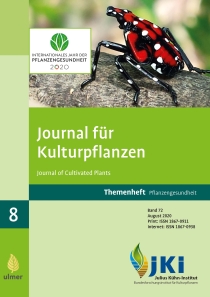Export of Plants and Plant Products from Germany: Maintenance of Established Trade and Market Opening Procedures
DOI:
https://doi.org/10.5073/JfK.2020.08.07Keywords:
trade barrier, spread of pests, phytosanitary measures, pest risk analysis (PRA), import regulations, apples, cereals, potatoesAbstract
With the continually growing international trade, which facilitates the introduction and spread of pests, requirements to minimize the risk of spreading pests are becoming increasingly important and trade barriers may emerge. As a result, phytosanitary aspects are becoming increasingly important for maintaining existing trade with plants and plant products and for the opening of new markets. The mandatory framework is mainly formed by the phytosanitary import regulations of third countries, but also by international standards. If the importing country has not established phytosanitary import regulations for a specific commodity, these can be negotiated and established in the course of a market opening procedure and the conduction of an appropriate pest risk analysis. At the best, a market access can be achieved. The individual steps of a market opening procedure are described and, based on three classes of goods important for Germany (apples, cereals and potatoes), it is shown which pests are relevant for third countries and which phytosanitary measures must be taken to prevent the spread of these pests.
Downloads
Published
Issue
Section
License
The content of the journal is licensed under the Creative Commons Attribution 4.0 License. Any user is free to share and adapt (remix, transform, build upon) the content as long as the original publication is attributed (authors, title, year, journal, issue, pages).
The copyright of the published work remains with the authors. The authors grant the Journal of Cultivated Plants, the Julius Kühn-Institut and the OpenAgrar repository the non-exclusive right to distribute and exploit the work.







